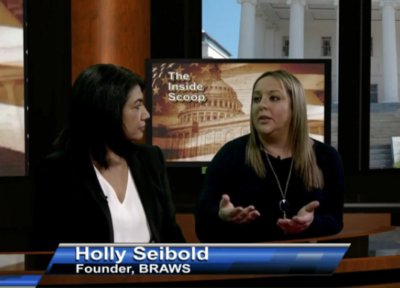Menstrual Equity Update with Holly Siebold
(Dec. 10, 2018) Catherine Read interviews Holly Seibold (President) and Shaheen Khurana (Legislative Affairs) of BRAWS (Bringing Resources and Aid to Women’s Shelters), along with Del. Jennifer Boysko and FCPS School Board Member At-Large Karen Keys-Gamarra regarding the issue of menstrual equity.
Catherine first speaks with Holly Siebold about the term “menstrual equity” and why it is on the radar of so many people in the Commonwealth of Virginia. Holly became involved with this issue several years ago, when she founded the organization Bringing Resources and Aid to Women in Shelters (BRAWS). At the time, her goal was to get menstrual supplies to low-income women who did not have the resources to purchase them.
As Siebold has learned more and more about this issue, she has championed the idea of bringing full access of these products to all women in need. She specifically mentions that the place where the most work needs to be done is in the public schools. In her travels throughout Northern Virginia she has found that 30% of the girls surveyed have had to miss school to manage their period. This could be for something as simple as not having a tampon or pad at school, or being forced to go home to get products or to change clothes. This puts girls at a tremendous disadvantage, especially those who come from low-income households who do not have the necessary resources to deal with these challenges.
In addition to the fact that they are forced to miss school, many young women feel shame and stigma about having to manage their menstruation. Schools are not equipped with products to help the girls, and students might not want to tell the nurse or counselor what their problems are due to shame, anger or embarrassment. Part of Holly’s work is to help change this dynamic, and to change how adults approach and talk about menstruation. BRAWS also sponsors a teen council to help de-stigmatize periods and elevate this issue, as well as advocate and raise funds for those in need.

Del. Jennifer Boysko joins Catherine in the following segment to discuss her work to bring the Dignity Bills to the floor of the chamber in 2019. These bills are designed to abolish the sales tax charged on menstrual products to help ease the burden of the cost of these goods. The first bill introduced last year would have removed the tax only during the sales tax holiday, which is designed and marketed as “back to school” sales tax relief. Currently, everything from wedding dresses to candy are included as part of this tax relief program. The second bill would have removed sales tax permanently on all purchases throughout the year.
Both bills were killed in committee last year, but Boysko hopes to have a better outcome with these bills during the 2019 session. As menstrual equity is elevated in the state and national discourse, she believes that they can make progress. To date, fifteen states have already removed sales tax from these products, and NY, CA and IL have all required their school systems to provide menstrual products free of charge to students in need.
Catherine’s final guest is Karen Keys-Gamarra, School Board Member at Large for Fairfax County Public Schools. She has successfully included support for menstrual products to be supplied to students who need them in the FCPS legislative package being sent to Richmond this year. Keys-Gamarra strongly believes that as the largest school division in the state, it is important to include this as a priority and be a leader on this issue. She notes that the school accreditation standards have recently been updated to include school absence as a factor. Based on the student surveys indicating that girls are missing classes due to not having access to menstrual products, she felt compelled to raise the issue. FCPS Superintendent Scott Braband has been directed to explore the scope, cost and impact that this request would have on the school system’s budget.